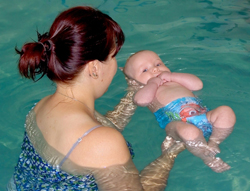The Importance of Learning to Swim at a Young Age

While it’s never too late to learn how to swim, there are great benefits that can be realized when learning at an early age. AquaMobile Swim School discuss a few of the top reasons to get your little fishes in the water:
1. Swimming lessons help prevent drowning
In Canada, drowning is the number one cause of unintentional injury deaths among children ages 1 to 4, and the second leading cause of preventable death for children under 10 years old. A study by Dr. Ruth Brenner of the Eunice Kennedy Shriver National Institute of Child Health and Human Development found that swimming lessons may help to reduce the risk of drowning by as much as 88%. Certain swim programs are designed to teach infants self-rescue skills such as floating on their back until help comes.
2. Infants tend to be comfortable with water versus older children
As toddlers’ brains are developing, they absorb information quickly and will have an easier time adapting to water. Familiarizing infants with water reduces the chance that they will fear it when they are older, or be affected by negative attitudes towards swimming. Research shows that non-swimmers are unlikely to learn after the third grade.
3. Swimming encourages earlier physical development
It is possible for an infant to learn to swim before he/she can walk. As a low-impact sport, this means that toddlers can be active at an early age and develop coordination skills earlier. A study from the Norwegian University of Science and Technology found that babies who learn to swim have better abilities to balance and grasp objects than their non-swimming peers. This may be because swimming allows infants to use their muscles more than they do on land. While toddlers do not have the motor skills to properly perform strokes, swimming lessons will teach them to move and float independently in the water.
4. Swimming allows children to develop their social skills
During swimming lessons, babies are frequently interacting with others. They learn to follow directions from their instructor, play and share with other babies, and listen to their parents. According to the German Sports College Cologne, young swimmers are less shy, more independent, and more comfortable in social situations than non-swimmers.
5. Swimming helps develop psychological benefits
Having been in the womb for nine months, most infants are born with a love of water and find it stimulating to their senses. In addition, infants who swim have greater self-discipline, as they learn to respect the rules of the water and those around them. Infants also gain more self-confidence with every technique they learn, further encouraging them to learn. This builds a good foundation for skills that go well beyond swimming.
Swimming is often said to be one of the most important life skills and the earlier a child learns to swim, the earlier they can reap the benefits.
Diana Goodwin is President of AquaMobile Swim School, a private swim school that offers high quality swim instruction at clients’ home and condo pools in over 25 cities across Ontario. AquaMobile Swim School can be reached at info@aquamobileswim.com or 1-888-950-7946



